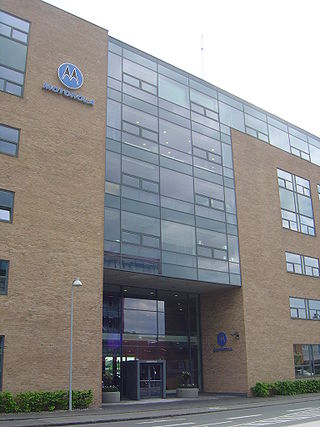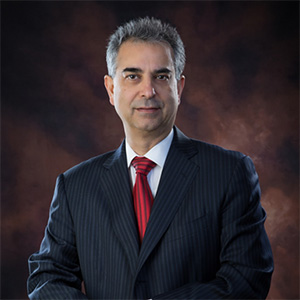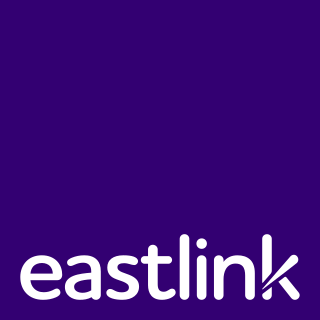
Motorola, Inc. was an American multinational telecommunications company based in Schaumburg, Illinois. It was founded in 1928 as Galvin Manufacturing Corporation by brothers Paul and Joseph Galvin. The company changed its name to Motorola in 1947. After having lost $4.3 billion from 2007 to 2009, Motorola was split into two independent public companies, Motorola Mobility and Motorola Solutions, on January 4, 2011. The reorganization was structured with Motorola Solutions legally succeeding Motorola, Inc., and Motorola Mobility being spun off.

Rouzbeh Yassini, known as the "Father of the Cable Modem", is an Iranian-American inventor, engineer, and author, who has gained international reputation as a "broadband visionary" for his pioneering work in broadband industry and inventing the cable modem, establishing the cable modem industry standards (DOCSIS) through Cable Television Laboratories (CableLabs), the Society of Cable Telecommunications Engineers (SCTE) and the International Telecommunication Union (ITU). He is executive director of the University Of New Hampshire Broadband Center Of Excellence and Founder and board member of the YAS Foundation. Yassini is the author of “Planet Broadband”, a humanized look at broadband technology and its contributions to the society, as well as “Broadband Intelligent Series”, a series of white papers on digital services. He is a worldwide speaker and is often interviewed and quoted in the press for his vision on the future of broadband. His lifetime vision and dream is that all the people in the world have ubiquitous access to the broadband and be connected all the time. He believes that broadband connectivity is a fundamental right for all the human beings, what he has referred to it frequently as "Broadband Equality". Yassini was founder, CEO, and president of LANcity, the early pioneer in cable modems. He has worked with Cable Television Laboratories, Inc. (CableLabs) a research arm of the cable television industry in charge of the DOCSIS and on CableHome projects as the cable industry's point man on standardizing the cable modem's global footprint. He served as a senior executive consultant to the cable industry's CEOs while being president and CEO of YAS Corporation. He also has worked with Comcast and Cablevision on numerous programs relating to innovation of broadband technologies. From 2004 to 2007, Yassini worked with the CTO's office at Comcast to create the first industry standard IP-Set top Box specification known as the RNG specification. He has been involved in managing and advising companies ranging from $100 million to $50 billion and served as member of the board of directors on BAS, TrueChat, and Entropic from 2001 to 2008, and UPC Technical Advisory Committee. He created and chaired the Vendor and Operator Executive Advisory Forum of the U.S. Cable Center. He was a member of the Liberty Global Inc. (LGI) advisory technology board from 2001 to 2017. Yassini was director of Visteon from January 2015 to December 2020. As CEO and Chairman of Irystec, a Montreal-based firm founded in 2015 specializing in perceptual display processing technology, Yassini was able to successfully have the french auto company Faurecia acquire the company in 2020, despite the Covid pandemic. Working for more than 30 years in the broadband industry and achieving major accomplishments, Yassini received many awards from different organizations. He was named multiple times as CED Broadband 50 designate. CED Magazine named him “1998 Man of the Year” for creating and fostering the multibillion-dollar cable modem broadband industry. The National Cable & Telecommunications Association (NCTA) awarded Yassini with a 2004 Vanguard Award, the Cable Industry's highest honor in recognition of his contributions and dedication to the industry. The Cable Television Pioneers also inducted Yassini into the class of 2012 for his tremendous and meaningful contributions to the cable industry. He is a member of the Lane Department Academy as well as West Virginia University Academy of Distinguished Alumni.

SK Telecom Co., Ltd., abbreviated as SKT is a South Korean wireless telecommunications operator and former film distributor and is part of the SK Group, one of the country's largest chaebols. It leads the local market with 50.5 percent share as of 2008. SK Telecom is the largest wireless carrier in South Korea, with 27.019 million subscribers as of Q4 2017.

GCI Communication Corp (GCI) is a telecommunications corporation operating in Alaska. Through its own facilities and agreements with other providers, GCI provides cable television service, Internet access, wireline (networking), and cellular telephone service. It is a subsidiary of Colorado-based company Liberty Broadband, a company affiliated with Liberty Media that also owns a 26% interest in Charter Communications, having been originally acquired by Liberty in 2015.
Charter Communications, Inc., is an American telecommunications and mass media company with services branded as Spectrum. With over 32 million customers in 41 states, it is the largest cable operator in the United States by subscribers, just ahead of Comcast, and the largest pay TV operator ahead of Comcast and AT&T. Charter is the fifth-largest telephone provider based on number of residential lines.

Scientific Atlanta, Inc. was a Georgia, United States–based manufacturer of cable television, telecommunications, and broadband equipment. Scientific Atlanta was founded in 1951 by a group of engineers from the Georgia Institute of Technology, and was purchased by Cisco Systems in 2005 for $6.9 billion after Cisco received antitrust clearance for the purchase. The Cisco acquisition of Scientific Atlanta was ranked in the top 10 of largest technology acquisitions in history and was Cisco's largest acquisition to date. Prior to the purchase, Scientific Atlanta had been a Fortune 500 company and was one of the top 25 largest corporations in Georgia.

Eastlink is the operating name of Bragg Communications Inc., a Canadian cable television and telecommunications company. The privately held company was founded in Nova Scotia in 1969 by the Bragg family, and has grown since through the amalgamation of several telecommunications companies.
Digi International is an American Industrial Internet of Things (IIoT) technology company with headquarters based in Hopkins, Minnesota. The company was founded in 1985 and went public as Digi International in 1989. The company initially offered intelligent ISA/PCI boards with multiple asynchronous serial interfaces for PCs. Multiport serial boards are still sold, but the company focuses on embedded and external network communications as well as scalable USB products. The company's products also include radio modems and embedded modules based on LTE (4G) communications platforms.

Telit Cinterion is an Internet of Things (IoT) Enabler company headquartered in Irvine, California, United States. It is a privately held company with key operations in the US, Brazil, Italy, Israel, and Korea.
Arris International Limited is an American telecommunications equipment company engaged in data, video and telephony systems for homes and businesses. On April 4, 2019, Arris was acquired by network infrastructure provider CommScope.
RF Micro Devices, was an American company that designed and manufactured high-performance radio frequency systems and solutions for applications that drive wireless and broadband communications. Headquartered in Greensboro, North Carolina, RFMD traded on the NASDAQ under the symbol RFMD. The Company was founded in Greensboro, North Carolina, in 1991. RF Micro had 3500 employees, 1500 of them in Guilford County, North Carolina.
The RAD Group consists of a number of independent companies that develop, manufacture and market solutions for diverse segments of the networking and telecommunications industry. Each company operates independently, without a holding company, but is guided by the group founders under a collective strategic umbrella. Companies share technology, engage in joint marketing activities and benefit from a common management structure.
Cable Television Laboratories, Inc. (CableLabs) is a nonprofit corporation promoting innovation as a research and development lab founded in 1988 by American cable operators. System operators from around the world are eligible to be members.
Airvana was acquired by CommScope in 2015. Prior to that, the company was an independent provider of small cells and femtocells based on fourth generation (4G) Long Term Evolution (LTE) and third-generation (3G) CDMA2000 EV-DO mobile broadband technologies. Airvana products enable mobile operators to deliver 3G and 4G cellular data services indoors.
Comcast MO Group, Inc. was created by US WEST Inc, one of the original Baby Bells Regional Bell Operating Companies, acquisition of Boston-based Continental Cable and combined with its previously acquired Atlanta-based Wometco/GTC. Wometco/GTC adopted the MediaOne name a year earlier. Media One Group was acquired in 2000 by AT&T Broadband, which was subsequently acquired by Comcast in 2002.
2Wire, Inc., was a home networking Customer Premises Equipment (CPE) manufacturer that provided telecommunications companies with hardware, software, service platforms, and remote CPE management systems. The company was headquartered in San Jose, California, in the Silicon Valley. The company had employed approximately 1,600 employees globally, including 550 in R&D, sales and administration, 450 in customer care and 600 agency employees in five U.S. offices and an additional nine offices around the world by July 2010. The 2Wire HomePortal residential gateways were distributed by broadband service providers such as AT&T, Embarq, windstream and Qwest in the United States, Bell in Canada, Telmex in Mexico, BT Group in the United Kingdom, Telstra in Australia and SingTel in Singapore. In July 2010, Pace plc of the United Kingdom agreed to buy 2Wire for $475m (£307m).

Jerusalem Venture Partners (JVP) is an international venture capital firm founded in 1993. The fund specializes in investments in startup companies, focusing on digital media, enterprise software, semiconductors, data storage and cyber security, having raised close to $1.4 billion USD across nine funds. JVP is headquartered in Margalit Startup City Jerusalem with offices in Be'er Sheva, New York City and Paris.
Sierra Ventures is an American venture capital firm based in San Mateo, California. It is focused on early stage emerging technology companies.
Shlomo Rakib is an Israeli electrical engineer known for his work on Orthogonal Time Frequency and Space (OTFS) and other engineering topics. He is the holder of several patents and co-founder and current Chief Technology Officer of Cohere Technologies, which he had co-founded with Ronny Hadani. He also co-founded Terayon in 1993.








